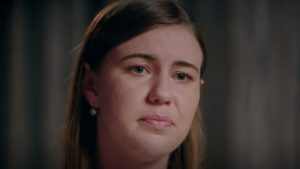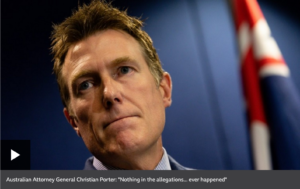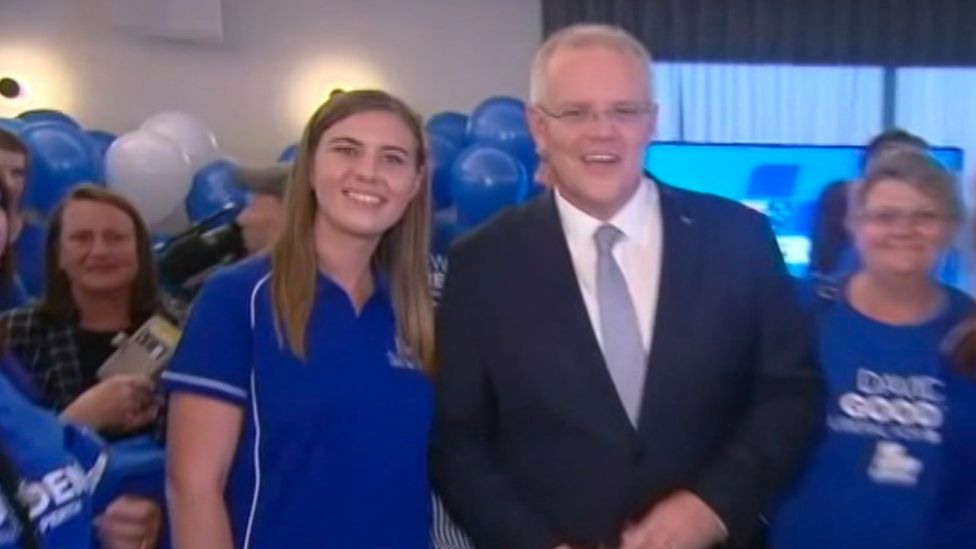
Brittany Higgins, an ex-political aide who alleges rape, has inspired other women to come forward
Accountabilty
Will rape allegations change Australia’s ‘toxic’ politics?
Shaimaa Khalil, BBC, 10 March 2021
(https://www.bbc.com/news/world-australia-56342255)
“In my time working in this area and particularly looking in workplaces over the [past] 30 years, I’ve never seen any moment like this,” said Kate Jenkins, Australia’s sex discrimination commissioner.
Ms Jenkins was describing the extraordinary moment Australian politics finds itself in after a succession of rape and sexual misconduct allegations in the past month.
This article contains language that some readers may find offensive
“I think our community is changing… we’re at a turning point,” she told the Australian Broadcasting Corporation (ABC) on Sunday.
Ms Jenkins has been appointed by Prime Minister Scott Morrison to oversee a review into parliament’s workplace culture following rape accusations that have primarily marred his own Liberal Party.
The allegations in the past few weeks – and how they’ve been handled – have hit a nerve with so many Australian women.
They have resurfaced long-standing grievances about how Canberra has historically treated women who work in the country’s corridors of power. And how – most of the time – power does not tilt in their favour.
Damaging allegations
Despite the brave faces the prime minister and other cabinet ministers have put on in recent weeks, this has been a very bruising time for the Morrison government.
The long-term effect of this fallout remains to be seen, but as it stands Mr Morrison has two senior ministers with crucial portfolios on sick leave.
Both in the shadow of the aftermath of separate and explosive rape allegations. Both facing mounting calls for them to step aside from their high-profile roles.
Defence Minister Linda Reynolds, who was admitted to hospital almost a fortnight ago for a pre-existing heart condition, will remain on leave for another month.
She’s faced sustained criticism for her handling of an allegation by Brittany Higgins, a former political adviser. Ms Higgins alleges she was raped by a male colleague in Senator Reynolds’ ministerial office in 2019 and said she did not get adequate support from the minister or her staff in the aftermath.
Ms Higgins – who made her allegation public in the media on 15 February – prompted several women to come forward with similar claims.
Later, it was reported that Ms Reynolds had called Ms Higgins a “lying cow”. It’s a remark she has not denied making and which the prime minister has said she “deeply regrets”.
Last week, Attorney General Christian Porter publicly identified himself as the government minister at the centre of a historical rape allegation – an accusation he has vehemently denied.
His accuser had gone to the police early last year, but then later took her own life. The allegation – which dates to 1988 – was made public last month after a letter was sent by the woman’s friends to the prime minister and two opposition senators.
Mr Porter said last week he would take a fortnight of leave for his mental health.
Mr Morrison said this was a matter for the police, who subsequently found there was “insufficient admissible evidence” to go ahead with an investigation. Prosecuting such cases is effectively impossible without an alleged victim’s testimony, legal experts say.
The government had hoped this and Mr Porter’s public – and at times emotional – denial would let them move on to talk about other subjects like the vaccine rollout or how the economy has fared better than expected this quarter despite the global pandemic.
But try as they may, those in power can’t seem to brush this issue aside. Neither the story nor the pressure have gone away. Scott Morrison still finds himself in hot water.

Australian Attorney General Christian Porter: “Nothing in the allegations… ever happened”There’s sustained pressure for an independent investigation into the allegation against the attorney general. Mr Morrison has also faced questions about why he did not read the allegations when they were sent to him.
Mr Morrison’s defence of his two ministers and his adamant refusal to hold an independent investigation – arguing it would set the wrong precedent – seems to have inflamed the situation.
He argues that the case with Mr Porter has been dealt by the “rule of law” and that effectively it should be left at that.
There have been arguments that his statement dealt with a very narrow aspect of the rule of law and that, complicated as the case is, there should be other avenues to investigate if the police cannot.
‘Toxic’ culture
But for many, especially women, this is also about leadership. It’s about a head of government who seems unattuned to the political or public mood at this very crucial moment.
“It is very dangerous for a prime minister to cast himself as a sort of passive onlooker in very serious instances like this, because the message that sends to the women of Australia is: ‘I’m not listening – I’m not taking this seriously,'” said Guardian Australia political editor Katharine Murphy on the podcast Full Story.
Julie Bishop, a former foreign minister and Liberal Party deputy leader, has argued the environment in Canberra often forces women into silence.
“There’s a powerful culture within all political parties to ensure that no individual does anything that would damage the party’s prospects, the party’s image, or its reputation, particularly at election time,” she told the ABC this week.
“It can mean that a culture develops whereby those who are prone to inappropriate or unprofessional – or even illegal – behaviour get a sense of protection. It makes it a very unusual workplace in that regard. But also, we don’t have the structures in place to counter that.”
Despite being one of the most senior and formidable female figures in Australian politics before she quit in 2019, Ms Bishop has revealed that a group of male Liberal MPs who dubbed themselves the “big swinging dicks” tried unsuccessfully to logjam her career.
“My ambition was to be the foreign minister of Australia, and I served in that role for five years. And likewise, I was deputy leader of the party for 11 years.” Ms Bishop said. “If their ambition was to thwart my aspirations, then they failed.”
Political arenas are known for their viciousness across the world. There’s an expectation of the verbal jabs and jousts in parliament chambers.
But what’s unique about sexism in Australian politics is its overtness. Many women lawmakers have regularly reported a culture of gender bias and intimidation in parliament and slurs that are specifically targeted at them as women and not at their male colleagues.
In 2012, the then prime minister Julia Gillard made an impassioned speech against what she called sexism and misogyny by Tony Abbott – the opposition leader at the time. Much of it, she argued, happened inside the chamber.
This all adds to a growing chorus of calls for change in Australian politics – an environment that has been described as toxic for women.
Treasurer Josh Frydenberg said as much recently when pushed on the subject. “This after all is the Australian Parliament and the rest of Australia looks to our workplace, as an example, and the culture in this place does need to improve and improve fast,” he told the ABC.
The Canberra bubble doesn’t just include the movers and shakers of the country’s politics – the press corps which covers it is also very much a part of that picture too. The problem, of course, is that it can often be too close and at times too cosy.
This was starkly demonstrated when Peter van Onselen, Network Ten’s political editor, was asked to make a general observation about the implication of these stories coming out the way they have.
“At a macro level, I couldn’t be happier that there’s a shift that has occurred and women are coming forward,” he said on the local Insiders programme.
“But when it’s someone you know and if they claim to be innocent, boy that’s a difficult issue.”
A reckoning for Australia
Only a couple of hours before the attorney general spoke publicly and placed himself in the eye of an ever-growing political storm, another young woman made some scathing remarks.
Grace Tame – a sexual assault survivor, activist and this year’s Australian of the Year – was asked what she made of the prime minister’s handling of Brittany Higgins’ rape allegation.
Mr Morrison had said that he had to consult his wife, Jenny, before making a public response and that he was looking at this case as “a father”.
Ms Tame said: “It shouldn’t take having children to have a conscience… On top of that having children doesn’t guarantee a conscience.”
 ABC
ABC
You could hear applause in the National Press Club hall in Canberra after her comments. She had sharply echoed a criticism raised by many Australian women of why it should take having daughters for a prime minister to take a rape allegation seriously.
It’s been described as Canberra’s “MeToo” moment. The framing of it almost doesn’t matter. It’s a moment of reckoning whichever way you look at it.
This is about women amplifying their voice to call out a powerful political system that seems to protect and defend only those in power.

